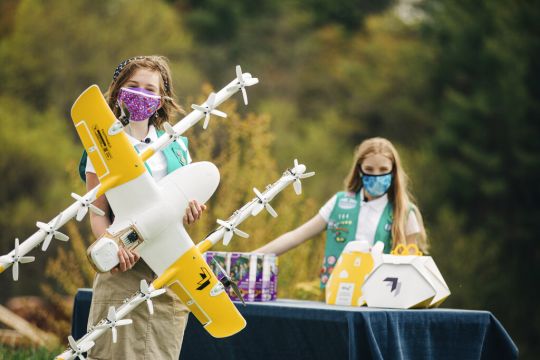A Google affiliate is using drones in the US to deliver Girl Scout cookies to people’s doorsteps.
The town of Christiansburg in Virginia has been a testing ground for commercial delivery drones operated by Wing, a subsidiary of Google’s corporate parent Alphabet.
Now the company is adding the famous boxed cookies to the more mundane pharmacy offerings, FedEx packages and locally-made pastries, tacos and cold brew coffees it has been hauling to a thinly populated area of residents since 2019.
Wing said it began talking to local Girl Scout troops because they have been having a harder time selling cookies during the pandemic, when fewer people are out and about.
It is also the latest attempt to build public enthusiasm for futuristic drone delivery as Wing competes against Amazon, Walmart, UPS and others to overcome the many technical and regulatory challenges of flying packages over neighbourhoods.

Federal officials will start rolling out new rules in early April that will allow operators to fly small drones over people and at night, potentially giving a boost to the commercial use of the machines. Most drones will need to be equipped so they can be identified remotely by law enforcement officials.
The 10lb Wing drone that made the first deliveries in Christiansburg in autumn 2019 is already an artefact held at the Smithsonian National Air and Space Museum. Whether it will go down in history as a revolutionary innovation or a utopian flop remains to be seen.
Amazon has also been working on drone delivery for years. In 2013, Amazon founder Jeff Bezos said in a TV interview that drones would be flying to customer’s homes within five years, but that deadline has long since passed.
The company did win government approval to deliver packages by drones last August, but Amazon said it was still testing them and has not started delivering goods to shoppers yet.
David Vos, an aerospace engineer who led Google’s Wing project until 2016, said he has been surprised that drone delivery projects have not taken off more quickly.
“I thought it was completely doable to be up and going by 2021,” Mr Vos said. While he still thinks drone technology is getting closer to delivering the size, weight and power needed to transport goods safely in populated places, Mr Vos said the tech industry also needs a cultural shift.
In particular, he said, it needs to bring on people from the traditional aviation industry who have experience building “safety-critical systems” that meet strict government standards.







